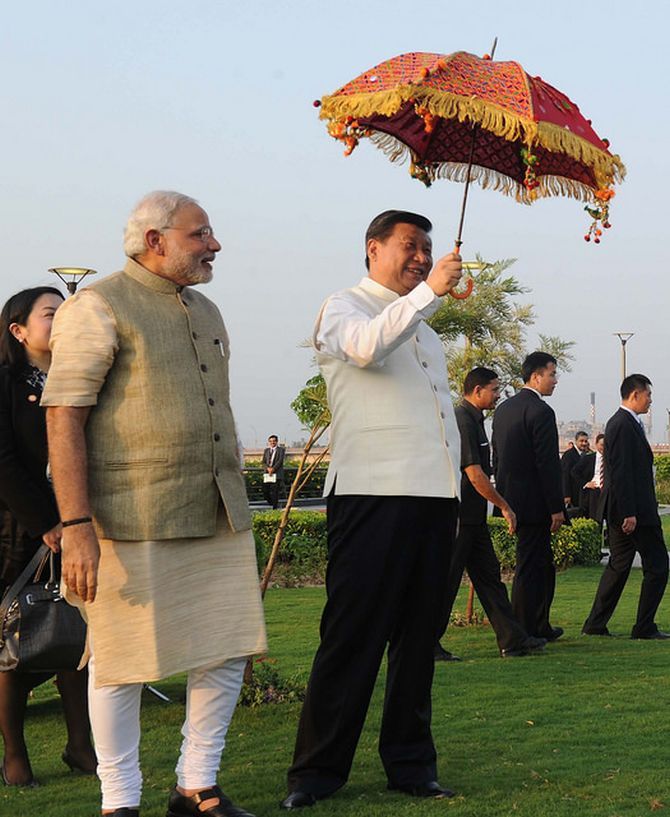
'It is a pattern of behaviour of the Chinese that whenever a Chinese leader visits India or an Indian leader visits China, some incidents take place.'
'When Modi visits China, we should look out for some similar demonstration by the Chinese.'
Delhi University historian Dr V C Bhutani is a China expert of long-standing, having extensively researched official records at the National Archives of India and of the Assam government of which the North-East Frontier Agency was a part, the Tibetan archives at Dharamsala and at the India Office Library. His extensive research has resulted in a book History and Politics of the Northern Frontiers of India to be published later this year. He spoke to Rediff.com contributor Rashme Sehgal.
With Prime Minister Narendra Modi making a trip to China later this month, there is a strong feeling amongst Chinese geo-politics experts that a strong government under Modi's stewardship can help kick-start momentum to end this long-running boundary dispute. What are your views on this?
Modi in India and Xi Jingping in China appear to be strong leaders and could well be in a position to advance matters towards resolution of the boundary problem. If they manage to decide on a solution, they could be in a position to persuade their respective people to accept such a solution.
It is in this context that some China experts in India have taken the view that the opportunity of the PM's visit should be used to explore possibility of a solution. In any case, it is worth making an effort.
Chinese experts claim the 'illegal' McMahon Line is at the heart of the boundary dispute between the two countries. This is a Line China has never accepted. If India does not make any concessions, there will be little chance of an agreement.
It has been a refrain on the Chinese side to call the McMahon Line an 'illegal' boundary. This is a hoax which should be laid to rest. China was never sovereign in Tibet at any time in history. In the 1720s certain events took place referred to in history as the establishment of a Chinese protectorate in Tibet. Even a protectorate does not deprive a place of its international status.
The Chinese have been in the habit of representing anyone and everyone as tributary to the Chinese emperor, including King George III of England who sent Lord Macartney as envoy to the Chinese court in 1792. These were merely Chinese claims which had no basis in history, least of all Tibetan history.
In 1913 Tibet was de facto independent, having chased all Chinese out of Tibet. The few that remained would have been butchered to a man but for the intervention of the British in India who allowed Chinese troops to enter British territory and then on to Calcutta and by ship to China.
When the Simla Conference was held from October 1913 to July 1914, the participants were British India, Tibet, and China: their representatives met on the acknowledged basis of the equality of the three 'plenipotentiaries'.
At that time China was down and out and not at all in a position to impose or enforce any kind of a decision on Tibet. Tibet enjoyed de facto independence from 1913 to 1949. In 1950 China occupied Tibet with India being in no position to take them on militarily.
The McMahon Line was made on the basis of an exchange of notes between the Tibetan and British Indian representatives, without the participation of the Chinese representative. The McMahon Line agreement was independent of the Simla Conference and was not signed by the Chinese representative.
Tibet was in effective control of territory on the other side of what later became the McMahon Line. The Chinese were not in the picture at all.
India sees China occupying 38,999 km in the western sector in the Aksai Chin region and will demand settlement of that. China has from the 1980s been claiming 90,000 sq kms in the eastern sector of Arunachal Pradesh. How do we go forward on that?
This is slightly inaccurate. From the very beginning of the boundary dispute China has been claiming both Aksai Chin where it started work on the road from Tibet to Xinjiang as early as 1952 and NEFA which China calls Southern Tibet, or Xizang, and India now calls Arunachal Pradesh.
There is historical evidence that China has from time to time claimed areas like Nepal, Sikkim, and Bhutan also. That does not mean that whatever China claims really belongs to China. These are merely claims.
Aksai Chin was not a part of Kashmir or Ladakh or Xinjiang or Tibet at any time in history, that is, it was not part of any Indian or Chinese province at any time in history. It has been a proper no-man's land, at very high altitude, an eternally frozen desert. There were no rivers in Aksai Chin. Hence there was no water, no vegetation, no animal life of any kind. It was uninhabited and was not taken under administration by any country.
China decided to move in and build a road through it from Tibet to Xinjiang. India had no reason to complain. Aksai Chin did not belong to India. Nehru was wrong when he said in the Lok Sabha: 'India's case on Aksai Chin is stronger than China's.'
Nehru based his statement on what he heard from (historian) Dr S Gopal, who was then director of the historical division of the ministry of external affairs. Nehru sent Gopal to London in 1959 to study the historical aspect of this question at the India Office.
Nobody knows what Gopal reported to Nehru or what kind of a written report Gopal submitted to the MEA. No answers are forthcoming from the MEA on what exact information Gopal had accessed and from which documents.
Several other distinguished scholars have accessed documents extensively at the India Office, but none of them ever claimed to have accessed documents which would justify Nehru's above-quoted statement in the Lok Sabha.
China can have no claim to NEFA (or Arunachal Pradesh).
In 1914 Tibet was fully in control of the areas to the north of the boundary made in that year and British India was in control of areas to the south of that boundary. As international law, that agreement is valid and binding on China as the successor government.
China's claim of suzerainty over Tibet up to 1949 and achievement of effective sovereignty over Tibet from 1950 onwards by sheer aggression are just that -- claims. That does not mean that Chinese claims in 1914 were valid that Tibet had no right to sign a boundary agreement in that year.
As I have pointed out, Tibet was in control on the northern side of the McMahon Line and made an agreement with British India. China was in no position to stop Tibet from making such an agreement. China was down and out and hardly on its feet after the Revolution of 1911.
What is the historical perspective of this dispute?
On March 14, 1899, the British government prepared a paper in consultation with the British Indian government and later instructed the British ambassador in Peking to embody it in a note to the Chinese government making suggestions about a boundary in the Aksai Chin area.
The boundary then suggested left Aksai Chin and Lingzithang on the Chinese side of the boundary. China never answered that note. However, the boundary suggested therein was generally along identifiable watersheds from Karakoram Pass to Lanak La.
China started making claims to territory in Aksai Chin from the mid 1950s and especially after India was invited in 1956 to the inauguration of the Aksai Chin road. Later, China started making claims in the eastern sector.
As the dispute became more intractable, China completed the picture by making claims in the middle sector.
All these areas were subjects of historical correspondence between Indian states and Tibet and not China, which was not in the picture then. After 1950, China took control of Tibetan archives and started making claims all along the frontier.
We know that in 1960 there was an opportunity which Nehru should have used to make an agreement about the disputed boundaries. But at this time Nehru was intoxicated by Gopal's report about Aksai Chin. And, so, Nehru refused to make a settlement and instead sent (then Chinese premier) Chou En-lai to talk with phlegmatic persons like Morarji Desai and Govind Ballabh Pant, who were the last persons who could have helped matters towards settlement. They did a lot of plain speaking with Chou and sent him home with an impression that a boundary settlement with India was not possible.
Chou also met R K Nehru, in 1960, 1961, and early part of 1962. R K Nehru also wrote on these questions at least up to 1968, which has also been quoted by A G Noorani. R K Nehru was concerned that India and China were drifting towards war for which India was unprepared. But no one listened to him.
After the Chinese aggression of October-November 1962, China held on to Aksai Chin and some areas to the west of it all of which it holds to this day but vacated the whole of NEFA and allowed India to reoccupy the entire area up to the McMahon Line.
Why did China go back from NEFA then? The answer perhaps is that China had really no serious claim to areas south of the McMahon Line. Chinese claims in NEFA voiced in later years were an afterthought.
Now China says -- if India wants a boundary settlement, it will have to make concessions in the eastern sector. This is nonsense. If China is adamant about it, then there will be no boundary settlement in the time to come.
What is the way forward?
The way forward is that Modi and Xi should agree on the principles of defining the LAC in all sectors. The LAC will become the basis of the International Boundary which officials will determine later on and then demarcate it on the ground.
In short, the following guiding principles may be followed.
In the western sector, the boundary to be aimed at should be a variant of the line proposed by the British government to the Chinese government on March 14, 1899. In view of the present ground situation, appropriate modifications in the line then proposed may be made.
In the middle sector, the boundary to be aimed at should follow natural features like watershed as far as possible. Departures from this may be made if there are reasons to adopt a different line in any location.
In the eastern sector, the boundary to be aimed at should be in the main the boundary line determined in 1914, with modifications wherever necessary in the light of later surveys and better cartography.
In the main, however, there should be no cession of territory by India in any part of the boundary in the eastern sector: we must hold fast to the principle of the validity of the 1914 line.
Xi Jinping's visit last September was to sign deals in railway development and to resolve the border dispute. The LAC was delineated following an informal cease-fire after the 1962 war. But both parties have different definitions of the LAC.
No, Xi did not come in September 2014 to sign a boundary settlement. We need not discuss other agreements or other relations here. During Xi's visit, there were demonstrations by Chinese troops in the western sector, which could have become serious if Indian forces had retaliated in kind.
It is a pattern of behaviour of the Chinese that whenever a Chinese leader visits India or an Indian leader visits China, some incidents take place -- skirmishes at the border, or a Chinese nuclear test in Lop Nor, or a Chinese attack on Vietnam -- all of these happened in the past.
When Modi visits China, we should look out for some similar demonstration by the Chinese.
There is -- so far -- no agreed definition of the LAC. This applies to all sectors. There is no LAC.
China is India's biggest trading partner. At the global level, both countries are members of BRIC, BASIC and the G-20 groups. They have a common stance on many World Trade Organisation issues. Why then has this become so complex?
China seems to continue to subscribe to its age-old belief in the centrality of China in the world. China's official name Zhungguo translates as 'Middle Kingdom,' that is, China is the centre of the universe and all other countries are satellites or 'barbarians'.
'Barbarian' is the Chinese translation of the Chinese word Yi, which we translate as foreigner. China does not regard any other country as equal to it -- not India, not Russia, and certainly not Japan and most decidedly not the United States.
With that kind of mindset, China shall never be on good terms with the rest of the world. It is a question of time before China provokes a showdown with a combination of other powers -- if it is rash enough to alienate many that are nearer home.
China does not consider India as equal to itself in any manner. That is why China does not support India as permanent member of the UN Security Council.
China hates to be sitting with four other permanent members of the UNSC because China considers them 'barbarians.' In the Chinese view they only have money and power but not culture or civilisation.
The prime minister has warned against the expansionist mindset of an increasingly assertive China. What do you feel about this statement?
There is no doubt about the expansionist designs of China. All Chinese suggestions of the Silk Route, the Maritime Silk Route, economic belt, economic corridor are really meant to sub-serve Chinese designs for expansion of Chinese influence worldwide and for clamping Chinese economic hold on other countries through which these routes will pass. These are not meant for the benefit of other countries, but for the promotion of Chinese interests.
Pakistan has become a willing tool of Chinese designs. Pakistan today is at the receiving end of attention and economic benefit from China, US, and Russia, in that order. China will tighten its grip as time goes on.
I have an uncomfortable feeling that there are some elements in India which are opposed to the making of a boundary settlement with China. To get anywhere near a settlement, the Indian government will have to find a way of getting past the influence of these elements.
Lately, more and more institutions which were earlier independent have now come under the influence and control of the MEA because they are all financed by MEA/ministry of defence and now headed by retired IFS personnel. As a result, expression of independent opinion is getting emasculated.
Image: Prime Minister Narendra Modi and Chinese President Xi Jinping in Ahmedabad during the latter's visit last September.











